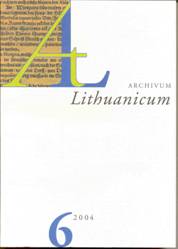Jeronimo Kiprijono Račkauskio knygu Munkos Viešpaties (1857), Vadovo i dangu (1857) ir Balso Dievo (1858) kalbos ypatumai
Linguistic features of the books Munka Wieszpaties (1857), Wadowas i Dangu (1857), and Balsa Diewa (1858) by Jernimas K. Račkauskis
Author(s): Daiva LitvinskaitėSubject(s): Theoretical Linguistics, Historical Linguistics, Lithuanian Literature, Baltic Languages
Published by: Lietuvių Kalbos Institutas
Keywords: Linguistic features; Lowland Lithuania; Munka Wieszpaties (1857); Wadowas i Dangu (1857); Balsa Diewa (1858); Jernimas K. Račkauskis;
Summary/Abstract: The analysis of the three religious books by Jeronimas K. Raèkauskis (1825-1889) Munkà Wieszpaties (1857), Wadowas i Dangu (1857), and Baùsà Diewa (1858) shows an attempt of the author to write in the Highland Lithuanian dialect instead of his native South-Lowland (dûnininkai) one. Those Lowland Lithuanian dialect features that are the most noticeable for a Lowlander were replaced by Highland forms. But from the six linguistic Lowland Lithuanian particularities that are only occasionally noticeable by a Lowlander, Raèkauskis changed into Highland Lithuanian just one. The third group the least noticeable Lowland Lithuanian dialectal features were also unnoticed by Raèkauskis and were not changed into the Highland Lithuanian equivalents. Hypercorrect forms also bear witness to Raèkauskis' efforts to write in Highland Lithuanian. But these efforts were undermined by his limited knowledge of the Highland dialect. A comparison of Bishop Motiejus Valanèius' (1801-1875) written language to the language of the priests in his bishopric (Raèkauskis, Dominikas Budrikas [1798-1873], Kalikstas Kasakauskis [ca. 1792-1866]) demonstrates the strong influence Valanèius had on these priests. Valanèius' usage suggests that he shaped his written language to make it more accessible to the peasants and to attract the speakers of the other dialect. This language policy was eagerly followed by certain priests. Still Kasakauskis did not follow Valanèius' writings literally, he accepted Valanèius' ideas to write for the peasants in language that was understandable to them.
Journal: Archivum Lithuanicum
- Issue Year: 2004
- Issue No: 06
- Page Range: 147-164
- Page Count: 18
- Language: Lithuanian

